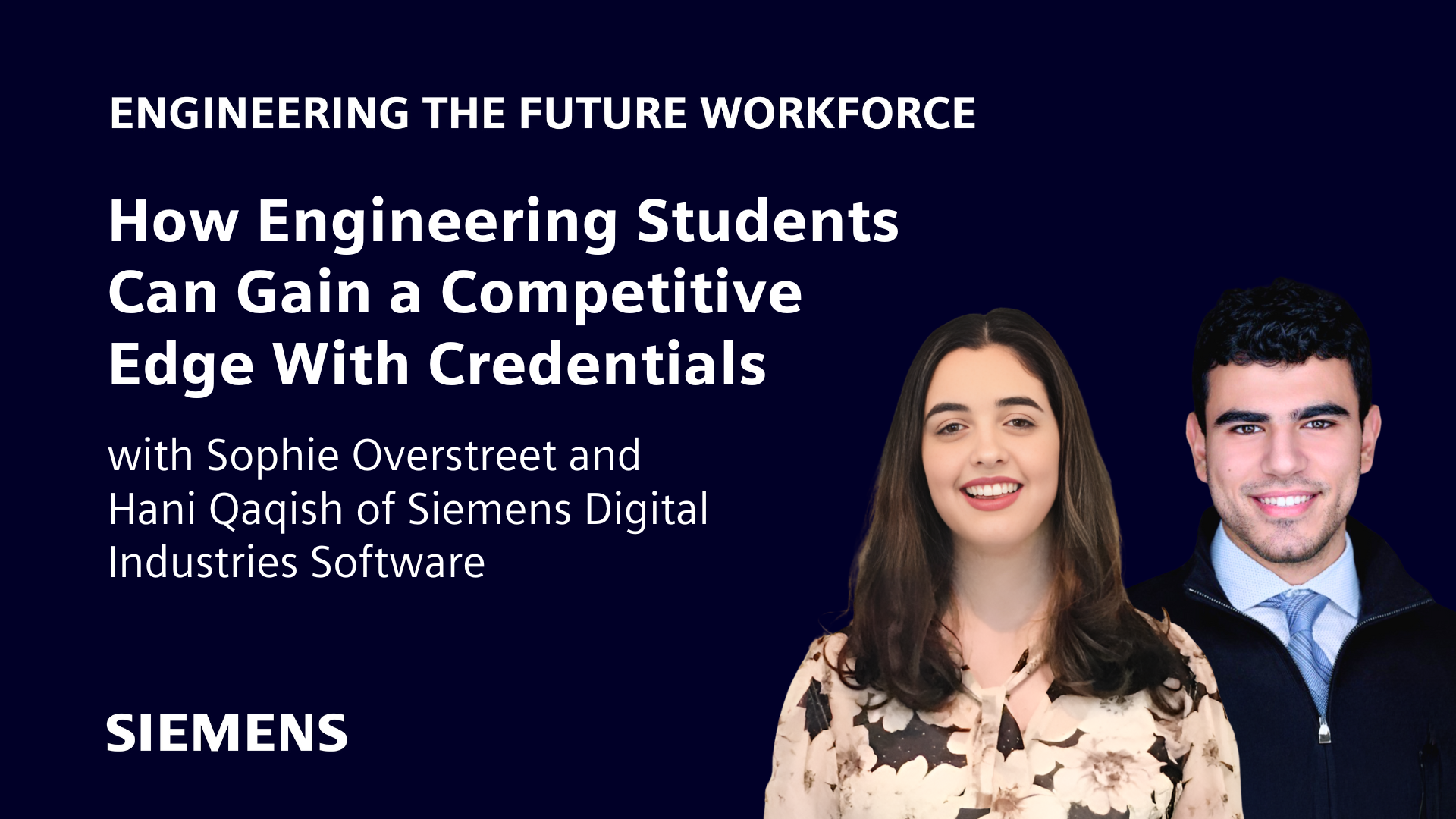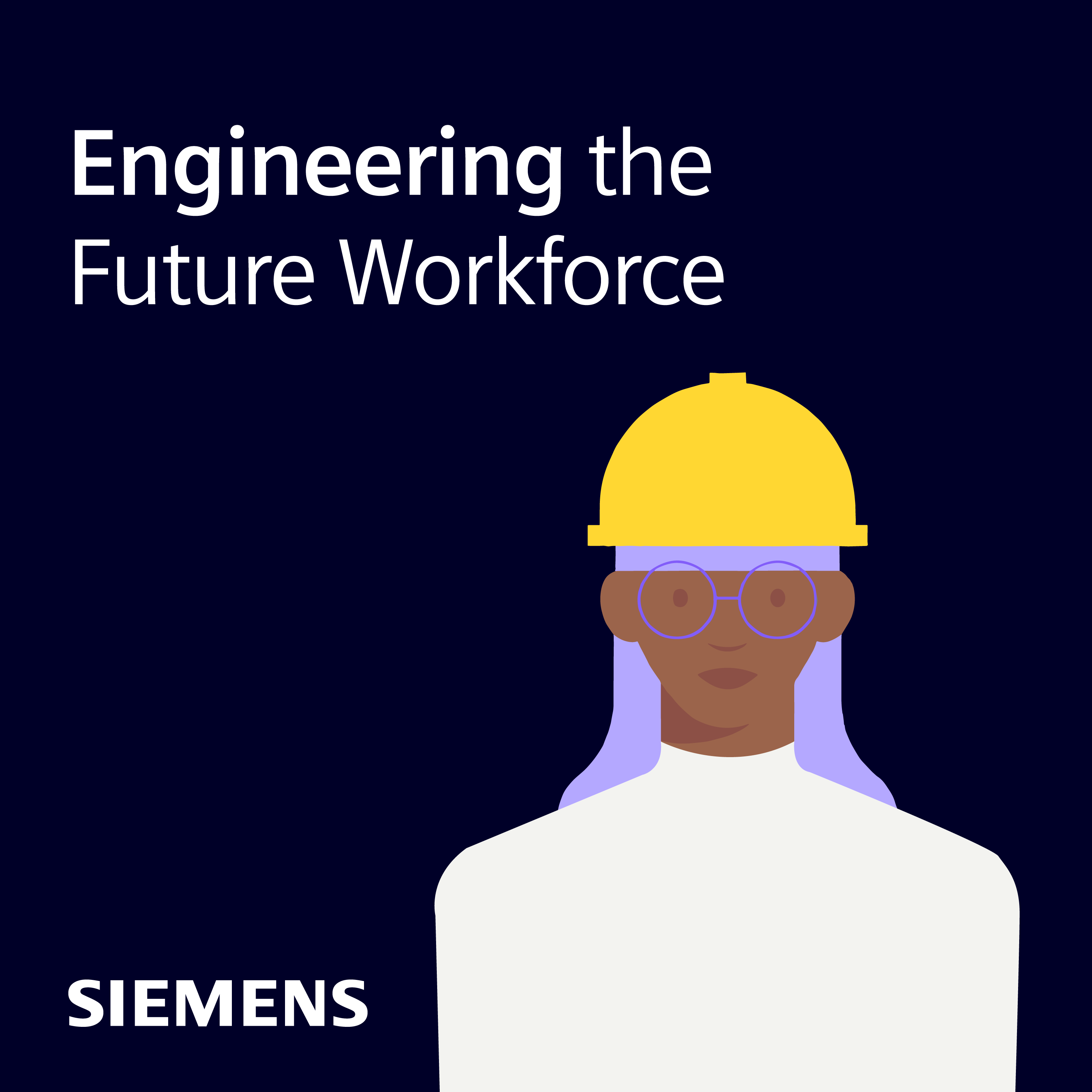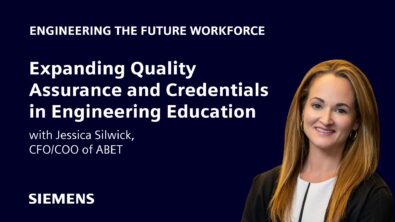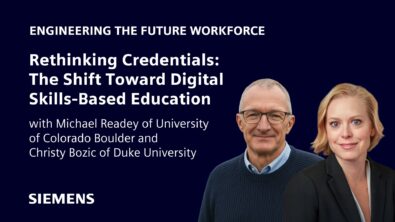How engineering students can gain a competitive edge with credentials with Sophie Overstreet and Hani Qaqish of Siemens Digital Industries Software

Credentials do more than validate skills, competencies and learnings — they build confidence and connect education to industry. Whether landing an internship or advancing a career, credentials like certifications or digital badges help engineers and other professionals stand out in a competitive job market.
In the latest episode of Engineering the Future Workforce, we sat down with two rising stars here at Siemens Digital Industries Software, Sophie Overstreet and Hani Qaqish, to get their perspective on credentials.
Since completing their bachelor’s degrees in 2023, Sophie and Hani have quickly distinguished themselves as emerging leaders at Siemens.
Sophie is a learning consultant specializing in product lifecycle management and Hani is an advanced technical product manager for NX X — while both have started their own businesses in their spare time.
Both Hani and Sophie have made a tremendous impact in a short period of time within the company, granting them a unique position on the topic. In this lively conversation, the two discussed how credentials have shaped their careers as well as how industry and academia can work together to better prepare students for success.
Listen on Spotify
Listen on Apple
Building confidence through credentials
Transitioning from college to the professional world can be daunting. Imposter syndrome is common and can create real barriers to career growth and advancement. With credentials, students can start building the confidence necessary to thrive by validating their skills in key areas.
“When I started at Siemens, everyone seemed so high-functioning, and I was lacking confidence,” Hani admitted. “That’s why credentials became important to me.”
Hani recalled how his early credentials made him feel valuable despite being new. “I felt valued as a new employee. They actually listened to what I had to say.”
For Sophie, certifications were a key differentiator. “What stood out in my internship application was my NASA training and the certifications I earned,” she said. “For example, my project management certification directly helped me in my marketing role.”
For students or professionals looking to upskill or bolster their resume, Siemens offers a number of free courses on Coursera that learners can complete to earn microcredentials and badges. These courses cover topics such as sustainability, model-based systems engineering, digital transformation and more.
Students can also access free software training on Siemens Xcelerator Academy to earn certifications on software tools used by leading employers like NX CAD/CAM, Solid Edge and Simcenter. Through Siemens academic program, students can download these software tools for free and start learning valuable skills that employers seek when hiring recent graduates.
How universities and community drive career success
Balancing coursework, responsibilities and career prep can be overwhelming. Universities and student organizations can help by fostering collaborative learning environments where students earn credentials together.
“Many students like to work in groups,” Hani observed. “If organizations create credentialing programs, it enhances learning and shows universities care about student success.”
Collaborative learning keeps students motivated, reinforces concepts and provides essential support. Peer-driven environments also build critical teamwork and communication skills.
Sophie highlighted the value of collaborative learning, stating that some of the most valuable credential programs she completed included opportunities to engage with peers and develop essential soft skills.
The future of learning and development
Learning is evolving to incorporate new technologies and meet the rapidly shifting demands of industry. Sophie has seen firsthand how personalized and on-demand education is taking over.
“One major trend is customized learning content. People and companies want training specific to their industry and needs,” she explained. “Credentials won’t just be one-and-done; we’ll see ongoing series of certifications with refreshers to keep skills sharp.”
Hani echoed this sentiment, emphasizing the importance of continuous learning for success. “Education is not a destination; it’s a journey, and that journey is always changing. That’s how I’ve approached my learning at Siemens.”
What’s next for workforce development?
Sophie and Hani predict credentials will become an even bigger part of education and career progression. Universities may embed industry-recognized certifications into curricula, ensuring graduates leave with both a degree and job-ready skills.
“We’re seeing more universities integrate credential programs,” Hani noted. “Some MBA programs even let students complete a certification instead of assignments. This trend will continue to grow.”
AI and digital transformation will further shape learning, from AI-powered coaching tools to personalized education paths that make training more efficient and accessible.
Elevating careers with credentials
Credentials aren’t just about collecting certificates — they build confidence, verify expertise and keep professionals competitive. Whether starting an internship or advancing in a career, continuous learning is key.
As Sophie and Hani’s experiences illustrate, investing in credentials pays off. Embracing credential-driven education and career development will be essential for the future workforce.
Want to learn more about the role of credentials in shaping careers? Listen to the full episode of Engineering the Future Workforce for insights from Sophie, Hani and Siemens’ Future Workforce Program.
Watch on YouTube

Engineering the Future Workforce
Engineering the Future Workforce explores emerging and best practices that are empowering the next generation of engineering talent. The series will showcase conversations with leading voices from academia and industry who are committed to improving learners’ digital skillset and mindset to accelerate innovation.


